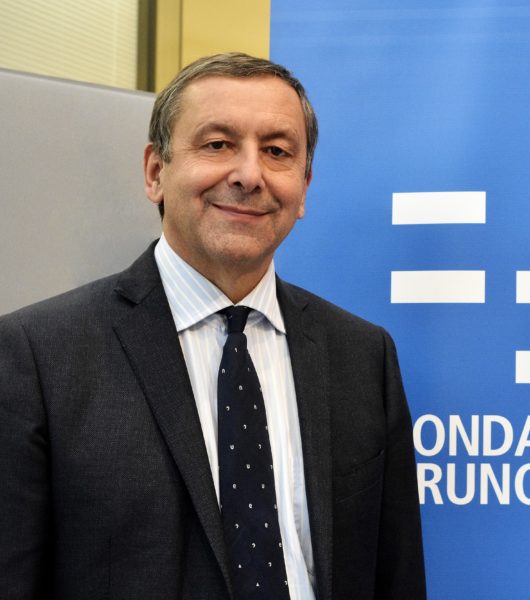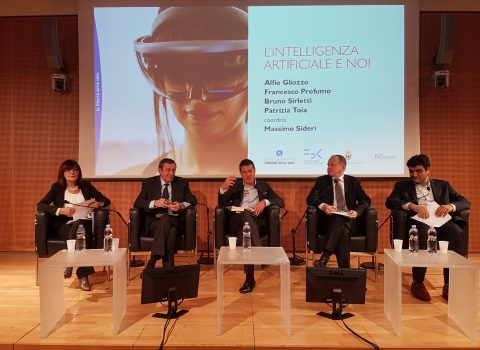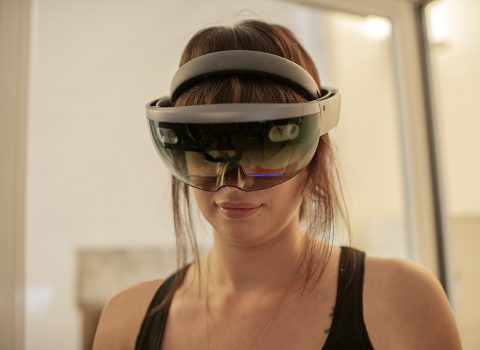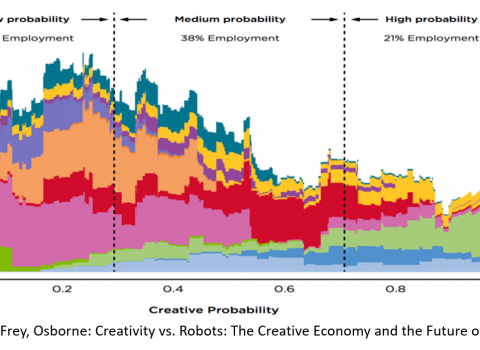2018: FBK dedicates the year to Artificial Intelligence
President Profumo presented the new strategic and business plans, dedicated to Artificial Intelligence. A tight 2018 calendar of events, starting with the sixth Bruno Kessler Lecture with Piero Angela
FBK dedicates 2018 to Artificial Intelligence
A whole year dedicated to artificial intelligence: this is FBK * AI 2018 – Future built on Artificial Intelligence, an initiative promoted by Fondazione Bruno Kessler of Trento and which provides a rich calendar of events, first of all the sixth Bruno Kessler Lecture to be held by Piero Angela, who, on March 19 at Povo (TN) will talk about how technology has changed and is changing society, starting from artificial intelligence.
And, as a basis for initiatives open to the general public, a solid ten-year investment plan that sees, for the first time in Italy, a research center proposing a strategic plan and a business plan. The “vision” of the two levels is based on artificial intelligence as a guiding thread for the upcoming research activities, which for FBK has only one main goal: to improve people’s quality of life.
“FBK has written in the past the history of research in the field of artificial intelligence thanks to the first research at Irst promoted by Bruno Kessler – said President Profumo opening the presentation press conference – Today, the Foundation is equipped to maintain its position of leadership and strengthen it in the future, writing an unpublished page of the history of artificial intelligence, which is based on a new generation of technologies that will not replace man, but will work with him to tackle the great issues of contemporary society, first and foremost health “.
President Profumo then went on to recall how: “Artificial intelligence is increasingly in support of human decisions. Some jobs will be replaced, but for sure there will be a need for more education and there will be many new jobs that we still do not know how to identify. The Foundation has a long tradition in the field of artificial intelligence, which started in the ’80s with Luigi Stringa’s Irst: he identified the two systems on which we are currently working, i.e. artificial intelligence and microsystems. Since that time the Foundation has gone through several phases: today all these experiences can be fully applied and has become an important reference in this phase in which applications must reach final users. Among the major issues, in addition to health, the factory of the future, the behavior of citizens within today’s cities and self-driving cars. I would say that the spectrum of applications is complete and stems from the intuitions of Stringa and Bruno Kessler “.
Artificial intelligence as a strategic “insight” that comes from afar, but is still topical and of interest for the development not only of FBK, but of the entire area also for PaT President Ugo Rossi, who pointed out: “Bruno Kessler’s insight was an absolutely extraordinary one: starting artificial intelligence in those years meant looking far ahead. The development of Trentino entails a connection with the rest of the world and therefore all this means development for our region, but also outside our of our region”.
THE 2018-2027 STRATEGIC PLAN
For the first time in its history, FBK has decided to adopt a strategic plan, a long-term vision document that defines the strategy and objectives of the Foundation for the next decade, to which a business plan for the three-year period 2018-2020 will provide immediate operation.
“This is a plan that is not only introduced in FBK for the first time, but we believe it is the only case in the history of research centers in Italy – President Profumo commented – it will allow FBK to get geared for the challenges of the future, in particular in view of the release of the ninth framework program of the European Commission “.
The main areas on which FBK will invest in the next decade are therefore:
- artificial intelligence for people and theirhealthy lifestyles (Health and Well Being)
- artificial intelligence for citizens who make their city more livable, enjoyable and safe (Smart Cities & Communities)
- artificial intelligence to allow humans and machines to work together, in a more productive, safe and pleasant working environment (Industry 4.0 / Mechatronics)
- artificial intelligence for citizens who care about the environment and natural resources (Energy and Environment)
- artificial intelligence to help humans discover the secrets of the world and the open questions of physics (Big Science)Main projects (flag projects)
1. PREVENTING DISEASES AND MANAGING HEALTH THROUGH ARTIFICIAL INTELLIGENCE
Personal health records, Health diary and a platform that works as a real personal coach to make it easier for citizens to adopt healthier lifestyles and to support greater autonomy for chronic patients in managing their treatment. These are just a few examples of how artificial intelligence can facilitate citizens’ interactions with healthcare professionals and institutions for remote monitoring and promoting healthy lifestyles.
A new smart platform of “prescribable” mobile apps will allow citizens to keep track of personal observations on the state of health (food, exercise, symptoms, etc.) collected day in and day out. For the chronically ill, they will be instead of support to manage in greater autonomy the information related to the state of their health.
Pilot studies for remote management are already underway for patients with type I diabetes (children, adults and pregnant women), cancer patients and home therapy peritoneal dialysis patients and in support of families with overweight and obese children.
2. CONNECTED CAR, 5G AND MONACO-BOLOGNA MOBILITY CORRIDOR
600 km, 3 countries (Italy, Austria and Germany), 15 partners under the guidance of FBK Create-net as coordinator. These are the numbers of the “Monaco-Bologna corridor”, one of the 6 major “corridors” promoted by the EC to improve the mobility of goods and people throughout Europe. Connected vehicles in an increasingly digital world, this is the scenario that has driven the European member states to sign a letter of intent for a large-scale collaborative effort in the field of connected and automated driving. The objective of the “mobility corridors” is to design and experiment the safe and sustainable mobility of the future through autonomous driving vehicles, the autonomous management of commercial fleets (trucks) and the advanced management of emergencies. The key technological factor is the 5G for the implementation of a new concept of connected and automated vehicles: a smart living environment to meet the needs of mobility in smart cities and throughout the European road network. The Monaco-Bologna corridor will also represent the test bench for cross-border testing, which makes the project a pilot of international interest.
3. THE SCIENCE OF COMPLEXITY TO ADDRESS THE DECISION-MAKING AND POLITICAL PROCESSES
The science of complexity supporting decision-making and political processes: this is how FBK combines in a single project – the inter-institutional laboratory of “Computational Human Behavior” – the ICT skills with the social analysis skills of the Institute for the evaluation of public policies to create reliable and innovative tools for analysis and decision-making. The final objective is to develop a quantitative approach – based on the science of complexity – to support decision-making and political processes, taking into account the social, cognitive and economic factors that contribute to and play a crucial role. The laboratory will produce an analytical framework for the integration of complex socio-technological, biological and economic systems and develop computational tools that will assist policy- and decision-making processes. Other areas of direct application of the laboratory include economic and behavioral sciences, computational social sciences and cognitive neuroscience.




